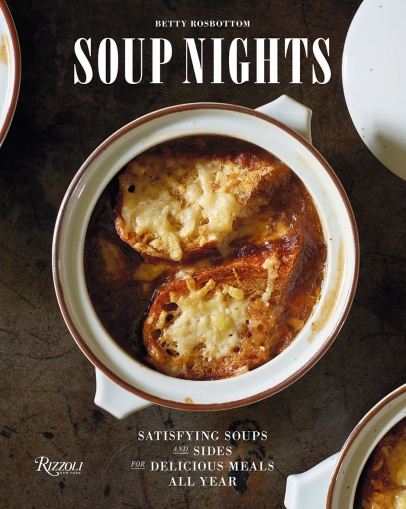Every Night a Soup Night
I know Betty Rosbottom only by phone, but with the first call, her southern lilt and unpretentious manner welcomed me as a friend. She spoke from the Paris apartment where she and her husband Ron, a professor of French and European Studies at Amherst College, spend two months each year.
Of the author’s 11 previous cookbooks, Sunday Soups, a seasonal treatment published in 2008, has been the most popular to date. But, Betty says, “a whole new stash of recipes and a whole new slew of ideas” clamored for their own soup book.
As her introduction to Soup Nights tells us: “Writing another soup book was like reinventing the little black dress—take something familiar and beloved, then add creative touches to freshen and give it new life.”
Culinary Capers
Betty and Culinary Capers, the annual fall cooking demo/luncheon/fundraiser for Pro- Musica Chamber Orchestra (details on page 24), debuted together in 1992, and her appearance at the Westin Hotel in November will be her sixth reprise, each time to introduce a new cookbook.
“I love working with Culinary Capers,” Betty says. “They are absolutely the most organized and do a terrific job for a really worthy organization. And Paul Bohn, the chef at the Old Southern Hotel, does a great job interpreting the recipes the way you’d like them presented and multiplying them out for several hundred people.”
She will also teach a soup class at The Seasoned Farmhouse (details below).
Betty has kept up with the food scene here, and “I’m unbelievably impressed by what a foodie city Columbus has become—good things are happening.”
What Betty modestly does not say is that she was one of the catalyzing forces in teaching Columbus about fine food.
Betty’s Own Culinary Capers
Of course, Betty did not begin life in a Paris kitchen. Born in Memphis, Tennessee, she studied in France while in college and discovered that she loved French cuisine even more than French literature. Her marriage eventually brought her to Columbus, where in 1976 she opened a cooking school, La Belle Pomme. It flourished at Lazarus Department Store (now Macy’s) from 1981–1995, closing when Betty moved to Massachusetts.
For 20 years Betty also wrote a syndicated cooking column and regularly contributed features to Ohio and Bon Appétit magazines.
She continues to teach in Massachusetts. “I get to hear what students are cooking and what foods they’re interested in. I try to incorporate that in the recipes I create.”
And those recipes go into her cookbooks.
How to Make a Cookbook
The recipe for a cookbook is long and complicated, nearly two years of steady work for Soup Nights. After Betty develops her recipes, she calls on her volunteer recipe testers, many from Columbus, and longtime assistant Emily Bell, from Dublin. About 10 volunteers prepare each recipe and answer a questionnaire: How long did it take you to make it? Did you like it? Would you make it again? Were there any techniques that needed explanation?
For problematic recipes, professional testers take over. “I spend a lot of time back and forth with the testers,” Betty says. Once the recipes pass muster, the book must still be designed and dishes photographed—for Soup Nights, Betty cooked 40 dishes in five days, all photographed in her own kitchen. Remembering, she chuckles at the feat.
“We had a food stylist, and I was the prop stylist, and Emily came from her old farmhouse in Dublin and brought props, and I had my own collection— my house looked like a cookware store.”
The soups in Soup Nights are organized by category: Vegetable; Chowders, Gumbos and Bisques; Bean and Grain; Hearty Comfort Soups; Light Soups Warm or Chilled. Even better, says Betty, a salad or sandwich plus dessert recipe accompany each soup recipe, “especially created to complement the soup so you can make a meal out of them.”
The je ne sais quoi of French Cooking
Betty fell for French cooking the moment she tasted it, and her yearly exposure to the country’s cuisine has only deepened the affair. “Paris is a great place to get ideas,” she says. “There are so many cuisines represented here. Over the past 10 years, I’ve seen a big Japanese influence.”
The great difference she sees in American and French home cooking is seasonality.
“We talk about vegetables and fruit being seasonal, but in the States we can get asparagus from Chile out of season and strawberries all year round. You would never find that in France, except perhaps in a grand food hall like Le Bon Marché. The everyday person cooking in France cooks seasonally, and not just produce, but scallops, for instance. You get a better price and a better product when they’re seasonal.”
The typical Frenchwoman also has une grande affaire with her butcher, who may provide not only a fabulous roast capon for a holiday dinner, but also the stuffing that accompanies it. “We have a number of friends who live here, and I noticed that none of them seem to cook the whole meal,” Betty says. “Typically, they make the salad and first course and buy the dessert and the bread.”
Time and Change
In a career spanning 35 years, Betty has compiled a wealth of experience as a cooking teacher, so I asked her about the differences she sees in her current students and readers compared to her early years at La Belle Pomme.
“When I first started in the ’70s and ’80s, people seemed to have all kinds of time on their hands to make pâtés and terrines and complicated sauces. Now,” Betty says, “everyone is very busy. They definitely want good food, but they want it healthier and quicker.”
And she finds people more adventurous in their eating. “We have a global cuisine now. South America is the current new area of discovery. People are more informed, due to Food Network and PBS and other TV stations—they made people more able cooks, more technically informed. The overall public certainly has a great interest in food and good eating.”
Home Again
Culinary Capers in Columbus is always a homecoming for Betty. “I loved living in Columbus,” she says. “I have so many good friends and I always look forward to seeing friends and former students. It’s such a friendly, open city and a very lovely place to live.”
Read Betty’s blog.






